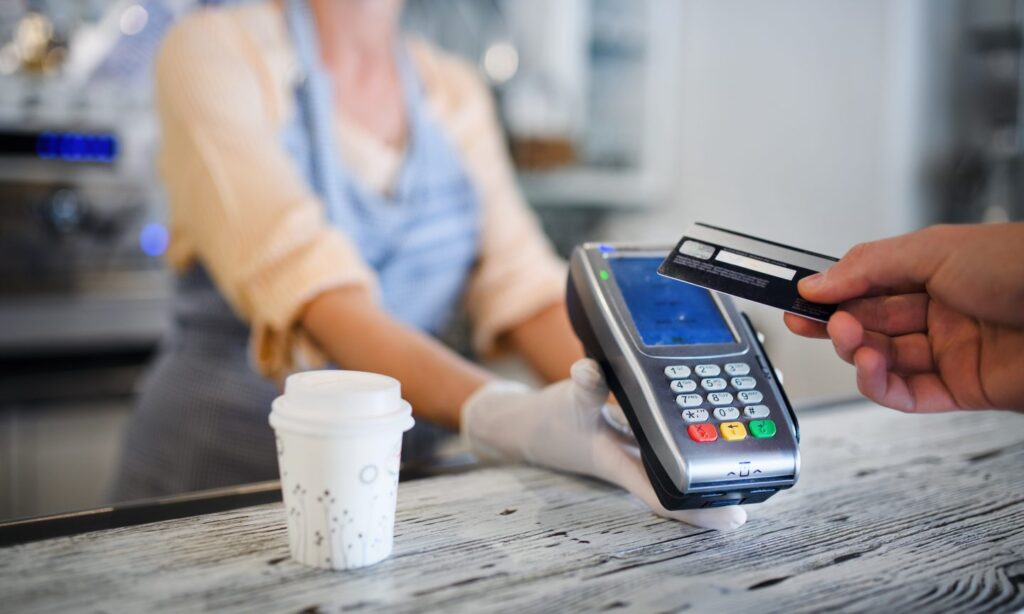Consumers broke up with cash during the COVID-19 pandemic, and it doesn’t appear that they’re rushing to reconcile.
Before the pandemic, Steffen Kaplan, a social media and visual consultant in the New York area, preferred using cash to credit cards. When we spoke in September 2020, he said cash helped him avoid overspending, but the coronavirus changed his spending habits.
“I don’t carry cash around with me anymore,” Kaplan said at the time. “Given that we have to remember to wear a mask, not touch anything, and go home and wash our hands every two minutes, it just seems easier to have a credit card rather than be fumbling around with cash,” he added.
Like Kaplan, more Americans shifted to digital payments amid the pandemic, and the number of consumers making the switch is projected to keep growing. According to the 2024 Global Payments Report by Worldpay, a payments technology company, digital wallets were the most popular method of payment for e-commerce in 2023, followed by credit cards. And for in-store purchases, credit and debit cards were consumers’ top choices. Cash accounted for just 12% of in-store payment methods in 2023, and Worldpay estimates it will drop to 8% in 2027.
But for some, contactless payments also come with added overspending risks. “When you are used to a cash-based spending system, it’s extremely easy to overspend when you don’t physically ‘see’ yourself spending the money,” says Eric Simonson, certified financial planner and owner of Abundo Wealth.
If you’ve made the switch to digital payments, but you also want to make sure to avoid debt, here are some strategies.
Try to pay off your credit card balance each month
Paying off your credit card balance each month isn’t always possible. In fact, among those who carry a balance, the average for households is around $21,541, as of June 2024, according to NerdWallet research.
But avoiding such rotating balances is a good goal because credit card debt is so expensive.
“It’s important for those making a transition to credit cards to understand the Sisyphean challenge of getting out of credit card debt,” says Sam Boyd, a certified financial planner and founder of Confido Advice & Investments, a financial planning firm, citing the generally high interest rates on credit cards. According to the Federal Reserve, the average credit card APR among those assessing interest is 23.37% as of August 2024.
Treat your credit card like a debit card, and try not to charge more than you can afford to fully pay off in one billing cycle. One way to guard against it is to pay off purchases immediately after you make them, rather than waiting until the end of the month and having to pay one lump sum.
Give yourself limits
Simonson suggests setting a low credit limit on your credit card if you’re worried about overspending. “Set your credit limit for just above what you normally spend each month on groceries,” he advises.
The downside to doing that is that using more than 30% of your credit limit can hurt your credit score, and it also means you can’t rely on the card in an emergency if you need to purchase more than normal. But the strategy does help keep you from overspending.
He also notes that many credit card companies offer a service where you can be texted as you are approaching your credit limit. “It’s a good idea to turn this on if you are new to using a credit card, to keep track of where you are with your spending throughout the month,” he says.
Jodie Kelley, CEO of the Electronic Transactions Association, says consumers can also stick with debit cards or prepaid cards, which can be added to digital wallets.
Here are a few other ways to set parameters on your credit card spending:
Consider a card with guardrails. Some financial technology companies like Chime and Varo offer secured cards where you set a spending limit by choosing how much money to move from your bank account to an account tied to the card.
Review your spending regularly
AnnaMarie Mock, a CFP based in Wayne, New Jersey, says there’s nothing wrong with primarily using credit cards as long as you are aware of your spending. “Regularly monitoring and comparing your actual purchases with your budget is critical to identifying any areas where you may be unknowingly overspending,” she says.
Monitoring can be done through apps that track transactions, through your account online or on your bank’s app, or with pen and paper. “Find a method that works for you,” she urges.
Kaplan carefully tracked all of his receipts. “If I come home with anything I bought, [my wife] reminds me or I remember that receipts go right on the desk and then she logs them. There has to be a system in place,” he says, “or you risk being surprised by an extra $200 on your credit card bill.”
If it helps, keep using cash
For some people, cash is a good budgeting tool because “you can’t spend what you don’t have. Once you run out of cash, that’s the end of spending for the month,” says David Tente, executive director at the ATM Industry Association.
When you’re using credit cards, on the other hand, you can keep spending up to your credit limit — but then you’re on the hook to pay it back.
